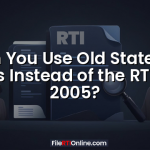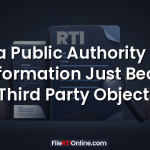Can a Son Get His Deceased Father’s Bank Account Details Through RTI?
Do You Need a Succession Certificate? What the CIC Case Shows
When a family member passes away, one of the most common problems children face is getting access to the deceased person’s bank statements, account history, or deposits. Many banks refuse to share information, citing “privacy” or “third-party information.”
This raises an important question:
Can a son use the RTI Act to get his late father’s bank account information?
Is a succession certificate mandatory for this?
This article explains the legal position, and more importantly, uses a real case decided Central Information Commission (CIC) to show how such issues are actually handled.
Can You Seek Deceased Parent’s Bank Details Under RTI?
Yes, but not automatically.
Information relating to a bank account falls under:
- personal information, and
- information held bank in a fiduciary capacity
Both categories are exempt from disclosure under Section 8(1)(e) and 8(1)(j) of the RTI Act—unless the requester is a legal heir who can prove entitlement, or unless larger public interest is involved.
So, the bank will usually ask for:
- proof of legal heirship
- No-objection certificate (NOC) from other legal heirs
- or a succession certificate (in some cases)
However, RTI cannot force the bank to disclose purely private details if legal heir status is disputed.
Do You Need a Succession Certificate?
A succession certificate is not always mandatory, but banks may demand it in cases where:
- another legal heir objects, or
- there is a family dispute, or
- the bank is not sure who is entitled.
If all heirs agree or documents are clear, banks often share the information without a succession certificate.
Real CIC Case Example: Son Seeking Father’s Bank Statement
A case before the Central Information Commission illustrates how such situations work in practice.
What Happened?
A son filed an RTI application with State Bank of India (SBI) asking for his late father’s account statement for 13 years.
The bank refused, stating:
- the information was personal and confidential
- the data was held in a fiduciary role
- the mother (wife of the deceased) objected to giving the information
- therefore, it could not be shared under RTI
The bank even informed the CIC that since the mother objected, they expected the son to produce a succession certificate.
What Happened Later?
The matter eventually went to court, where:
- the son was declared entitled to a share in the property
- he submitted those documents to the bank
- the bank then processed the matter and agreed to give the information
During the CIC hearing, SBI confirmed:
- some of the information had already been provided
- the remaining documents would also be provided within the time allowed
CIC’s View
The CIC held:
- no further intervention was needed
- the bank was already giving the information after entitlement was established
- RTI cannot override personal information protections without legal proof of heirship
What This Means for You
This case shows that:
- You cannot claim deceased parent’s bank data blindly under RTI.
- Banks will verify heirship before disclosing sensitive information.
- If there is a family dispute or objection, banks may ask for:
- succession certificate
- court order
- legal heirship certificate
- Once entitlement is proven, information must be provided.
When Will RTI Work?
RTI can help in situations like:
- bank delays the process without reason
- bank refuses to tell status of claim or pending documents
- bank does not disclose reasons for withholding the account
- bank is not responding regarding dormant/closed accounts
In these cases, RTI can push the bank to:
- explain the procedure
- clarify requirements
- give status updates
- share non-personal information
Conclusion
A son can obtain his deceased father’s bank account information, but RTI alone is not enough if legal heirship is disputed.
Banks are bound laws and can demand proper documents, especially if another legal heir objects.
The CIC case clearly shows that once heirship is established through proper documents or a court order, the bank must provide the information—but RTI cannot be misused to bypass legal procedures.


